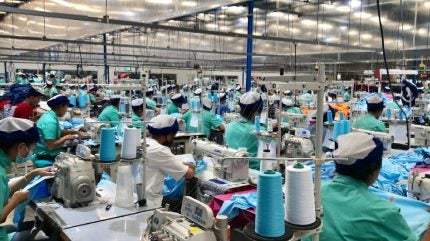
The Cambodian government has raised the monthly minimum wage of workers in the garment, footwear, and travel goods sectors by $2, with the new rate coming into effect on 1 January 2026.
Base pay for workers within these sectors will now reach $210 against the previous wage of $208.

Discover B2B Marketing That Performs
Combine business intelligence and editorial excellence to reach engaged professionals across 36 leading media platforms.
This decision was reached after deliberations by the National Council on Minimum Wage (NCMW) on 17 September at Ministry of Labour and Vocational Training.
Last week, Cambodia’s Prime Minister Hun Manet was tasked with determining the 2026 minimum wage for workers in these sectors. At that time, representatives from both workers and employers said they could not suggest a specific wage level, as reported by The Phnom Penh Post.
The Prime Minister upheld the decision taken by the representatives following 23 rounds of negotiations, the Khmer Times reported.
Employers had proposed maintaining the wage at $208, pointing to economic challenges including US tariffs and competition in global markets.

US Tariffs are shifting - will you react or anticipate?
Don’t let policy changes catch you off guard. Stay proactive with real-time data and expert analysis.
By GlobalDataHowever, after union representatives requested a review, the government proposed an increase to $210.
Workers can anticipate a monthly income between $227 and $238 when factoring in compulsory allowances and benefits.
Cambodia’s Labour Minister Heng Sour acknowledged the “successful” negotiation process, emphasising the balanced approach taken by both parties amidst a tough economic landscape.
“Despite uncertainty in the global economy and the fact that many countries in the region have not raised wages, the Royal Government of Cambodia has approved an increase, whether small or large, to ease workers’ burdens and improve their livelihoods,” Sour was quoted as saying.
The government has also agreed to monitor living costs closely, particularly utilities and rent.
“The ministry will investigate directly if there are inappropriate increases and take action against landlords or service providers who exploit the wage adjustment,” Sour added.
Kim Chansamnang, president of National Union Alliance Chamber of Cambodia expressed satisfaction with the wage increase, recognising its significance during challenging times.
Khmer Times quoted Chansamnang as saying: “We are pleased with this increase, even though it is small. It comes at a difficult time for the country, and we urge landlords and utilities not to take advantage of workers by raising fees.”
The improvement in minimum wage came as the country’s garment, footwear, and travel goods (GFT) sector registered strong first half of 2025, with exports totalling $7.38bn, as per the General Department of Customs and Excise.
This figure marks a 22% rise from the $6.02bn recorded in the corresponding period of the previous year.
Specifically, garment exports contributed $5.28bn to this total, also reflecting a 22% increase compared to the same timeframe last year.
Deputy Prime Minister Sun Chanthol, in a press briefing, highlighted that as a result of this announcement, Cambodia will encounter a smaller tariff barrier compared to neighbouring export competitors Vietnam and Bangladesh, which are subject to a 20% tariff rate.
In July this year, an industry expert informed Just Style that the ongoing border tensions between Thailand and Cambodia may have repercussions for Cambodian garment workers.





